JetBlue Says It Will Reduce Pollution Instead of Buying Carbon Offsets

 Why you can trust us
Why you can trust us
Founded in 2005 as an Ohio-based environmental newspaper, EcoWatch is a digital platform dedicated to publishing quality, science-based content on environmental issues, causes, and solutions.
JetBlue is taking back its 2020 promise to offset greenhouse gas pollution from its domestic U.S. flights and will instead focus on cutting its per-seat pollution in half by using “sustainable aviation fuels” generated from waste or plants.
The aviation sector is responsible for a massive amount of climate pollution, made even worse by the lack of high-speed rail in the U.S., but carbon offsets and the flashy purchasing thereof, have been shown to rarely reduce real-world pollution and can perpetuate devastating exploitation of Indigenous land and resources.
Early last year, United Airlines also decided against buying carbon offsets, opting instead to invest in CCS efforts.
As reported by The Verge:
Since 2020, JetBlue’s routes between San Francisco and Los Angeles have regularly run on sustainable aviation fuels. But the company’s eventually going to need a lot more SAF, which can be made from waste or crops like corn. It’s seen as a potential “bridge fuel” while electric planes and hydrogen-powered jets are still in development. JetBlue has inked deals with several companies to purchase more SAF, but it’s still in pretty limited supply and is more expensive than conventional kerosene jet fuel.
For a deeper dive:
For more climate change and clean energy news, you can follow Climate Nexus on Twitter and Facebook, sign up for daily Hot News, and visit their news site, Nexus Media News.
Subscribe to get exclusive updates in our daily newsletter!
By signing up, you agree to the Terms of Use and Privacy Policy & to receive electronic communications from EcoWatch Media Group, which may include marketing promotions, advertisements and sponsored content.

 233k
233k  41k
41k  Subscribe
Subscribe 



